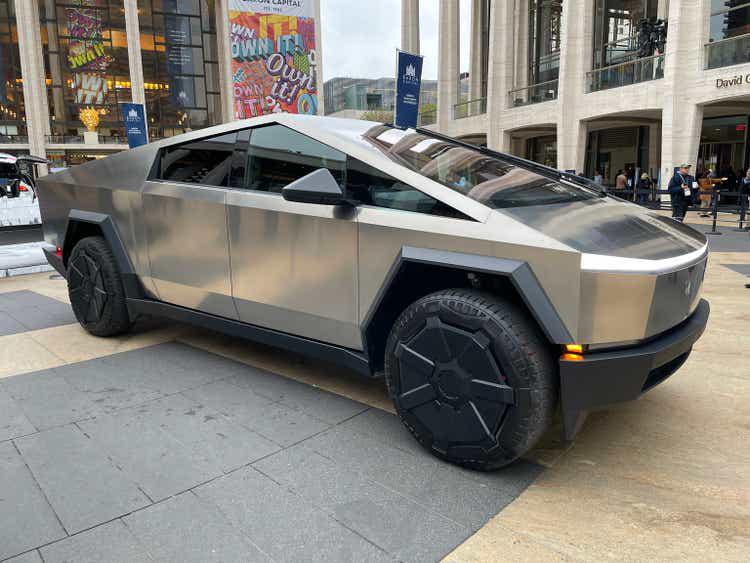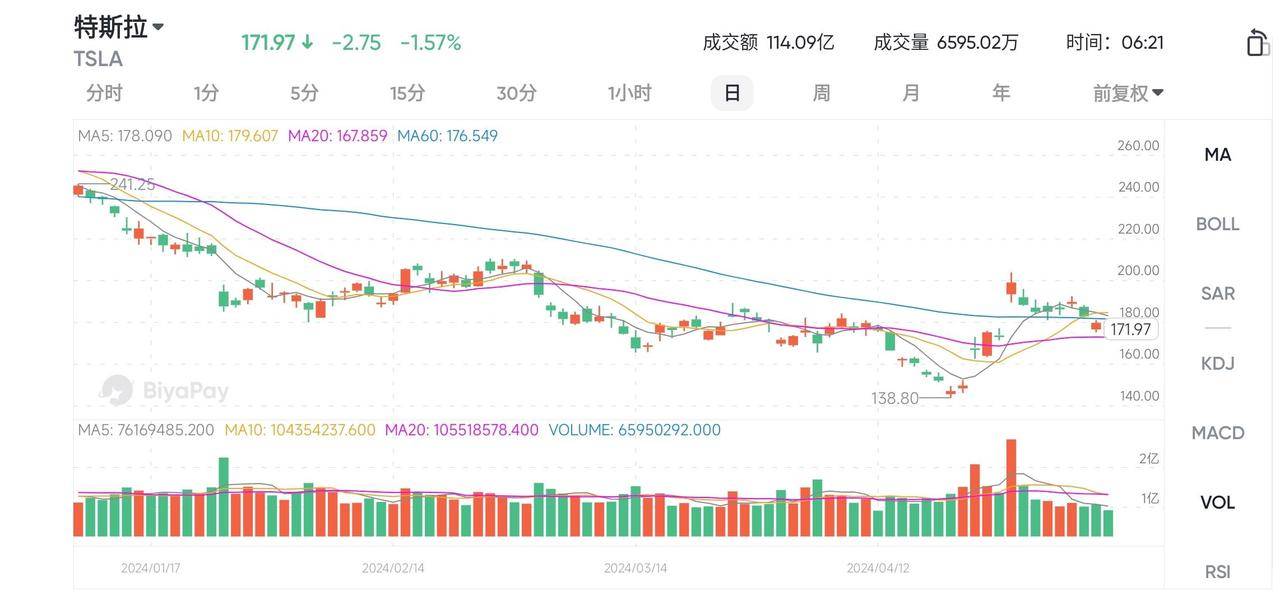- Remittance
- Exchange Rate
- Stock
- Events
- EasyCard
- More
- Download
Tesla Stock Could Soon Pay A Dividend - But Is Overvalued Nonetheless
Tesla, Inc. (NASDAQ:TSLA) certainly has had a rough start to the year businesswise as well as on the stock market. Sales cratered, as did Q1 profits.
Moreover, the Delaware Court of Chancery voided CEO Elon Musk’s 2018 compensation package, which would have seen him being granted stock options with a combined value of up to $56 billion (considerably less at the current share price).
The board is putting the same compensation package to a vote at the June 13th general meeting (cf. item 4 of the agenda). The company even launched a dedicated website to advocate shareholder approval of the measure.
If approved, the downside for shareholders would be a significant measure of dilution if and once the options would be exercised. All this comes at a time, when at least anecdotally, Elon Musk’s behavior outside his role at Tesla is increasingly alienating (potential) Tesla customers.
Yet despite all this, I see some positives for the company. Specifically, I believe that it is not unlikely that we will see Tesla beginning to distribute a dividend in the foreseeable future. Below, I will explain my reasoning behind that thesis and why I believe Tesla to be overvalued regardless.

Sustainable Profitability
Q1 net income amounted to $1.1 billion. While that figure is less than half what it was in the corresponding quarter of 2023 and represents a staggering decline of 86 percent QoQ, it still speaks for Tesla’s sustainable profitability.
After all, a quarterly profit of $1.1 billion, in absolute terms, is not all that bad. Also, keep in mind that Q1 of 2024 was certainly an awful quarter both on a macro level (the car market, EVs in particular, took a steep downturn; trade disruptions in the Red Sea and elsewhere) as well as for Tesla in particular (sabotage at the Grünheide factory, quality control issues with the Cybertruck).
If even under circumstances as adverse as these, there is still a sizeable net profit, I am quite confident that profitability will remain the norm. Furthermore, Tesla also has a rather strong balance sheet compared to industry peers.
There are some voices who suggest that the current wave of rather abrupt layoffs on short notice may hurt the company going forward in terms of recruiting. But I somewhat disagree with that sentiment. You have to keep in mind that Tesla is not the only business in its industry that is experiencing challenges. I assume that many of the laid-off employees will be back if they are wanted back. Despite my notoriously bearish stance on the Tesla stock, I am quite optimistic about the underlying business in the long run.
No Better Way To Spend The Money
Do profits necessarily mean a dividend? Certainly not. But absent distributions, the question of what to do with the money presents itself.
Let’s face it: the time of explosive growth is over for Tesla. Debt levels are entirely moderate. So, there is no pressing need to retain profits. This is especially true in a possible scenario where the development of the likes of AI solutions may increasingly be undertaken outside of Tesla at some of Elon Musk’s other companies.
At the same time, share buybacks do not make any sense at the current valuation.
Now, the most likely catalyst for instituting a dividend is, in my opinion, that Elon Musk needs money, while at the same time being keen, as per his own statement, to not reduce, but in fact, increase his stake in Tesla. And if a person who exercises effective control of a profitable company needs money, a dividend is a reasonably likely thing to happen. At the end of the day, directors serve the company’s shareholders. And I have yet to encounter the shareholder base that opposes being paid a dividend.
Elon Musk is what could be described as asset rich, but cash poor. Now, admittedly, Mr. Musk seems to be leading a relatively modest personal life for a man of his wealth. That being said, he has a plethora of business interests which - despite huge potential - are net cash consuming for now.
At the same time, Mr. Musk’s go-to source of liquidity has somewhat dried up: Under the amended share pledge policy (cf. p. 9 of the 2023 proxy statement), the maximum amount of permitted pledging of Tesla shares by its CEO is now capped at the lower of $3.5 billion or 25 percent of the value of pledged shares. Even being granted stock options under a reinstated compensation package will not change that limit.
Effectively, that means that Mr. Musk can no longer monetize his shareholdings without (a) selling shares or (b) receiving a dividend.
At the current share price, Tesla only accounts for a minority of his personal portfolio. Actually, his most valuable individual holding - albeit by a rather slim margin - is his 42 percent equity stake in SpaceX (SPACE), which at the latest private market valuation of $180 billion for the company should be worth about $75 billion, a few million dollars more than his last reported Tesla stake (keep in mind that the beneficial ownership includes unexercised stock options subsequently voided by court; the actual ownership figure are the 411 million shares owned outright).
But that notwithstanding, the absolute value of the position is still very significant. These absolute figures are also, why I believe he is reluctant to simply sell more shares (arguably the most straightforward way to monetize an asset). Such a move might be understood by the market as a sign of waning confidence, thereby triggering further sells and thus destroying value.
Consequently, a dividend would be the most straightforward option to generate liquidity without selling further shares.
Valuation
That’s all for funding. Now let’s take a look at the key issue: valuation. I don’t think Tesla has surpassed “an ordinary car company”.
In fact, some recent changes have further highlighted its nature as an ordinary car company. Especially the cuts to the super charger department make it unlikely that this business will have a significant impact in the short term. Although its energy production and storage business has grown by 7% annually, it does not seem to bring disruptive changes.
As a car manufacturer, Tesla’s market value is quite high. Even at the peak of profitability, the company’s Price-To-Earnings Ratio is around 40 times. Although the dividend is generally positive, it is not enough to make it stand out among competitors such as Toyota, Mercedes-Benz Group, or General Motors.
Even if Cybertruck solves the current quality control problems, it is unlikely to significantly improve overall profit margins due to its relatively low sales volume. The new small car platform called “Redwood” seems to have been shelved or cancelled in favor of developing low-cost new models based on existing structures.
Although this may boost sales to some extent, given that customers in this market segment are extremely price-sensitive and the competition is fierce, profit margin improvement seems unlikely.
Tesla’s high valuation is largely based on vague expectations of a possible “big event” in the future. The current market focus is on robot taxis, as can be seen from the positive market reaction after the announcement of the upcoming news on August 8th.
I predict that the release of robot taxis may become a key factor affecting stock prices in the short term, and the information released will determine whether it will rise or fall.
Conclusion
Firstly, regarding the possible future dividends, it should also be noted that Elon Musk may seek other sources of liquidity. For example, he may mortgage his stock in SpaceX (especially if an IPO is eventually conducted).
Secondly, due to large-scale cost reduction, it is possible to achieve profit growth in the short term. Given the poor performance in Quarter 1, we can expect significant improvement in performance in the second quarter due to the base effect.
This may cause short-term sharp fluctuations in stock prices after the release of second-quarter financial reports in July.
If the announcement or display of robot taxis is impressive or inspiring enough to stimulate investors’ imagination, it will keep more investors optimistic.
In summary, the editor believes that Tesla has proven itself to be a company with outstanding performance and strong profitability. Despite the recent stock price decline, the stock price volatility remains within the familiar range since 2020.
Moreover, the business areas that Musk has invested heavily in will also have an impact on the stock price, such as the revival of the automotive business. Thanks to the launch of Model 2 and the expected progress of FSD to level 3 by 2025, it can be foreseen that the strong rebound in automotive sales will significantly increase the valuation of this department. If you want to buy on dips, you must hold a more optimistic attitude towards Tesla’s future growth, use BiyaPay to search for its code, monitor market trends at any time, and trade online in real-time. You can also deposit digital currency (USDT) into BiyaPay, and then withdraw fiat currency to invest in US stocks in other securities.

Source: Seeking Alpha
Editor: BiyaPay Finance

























